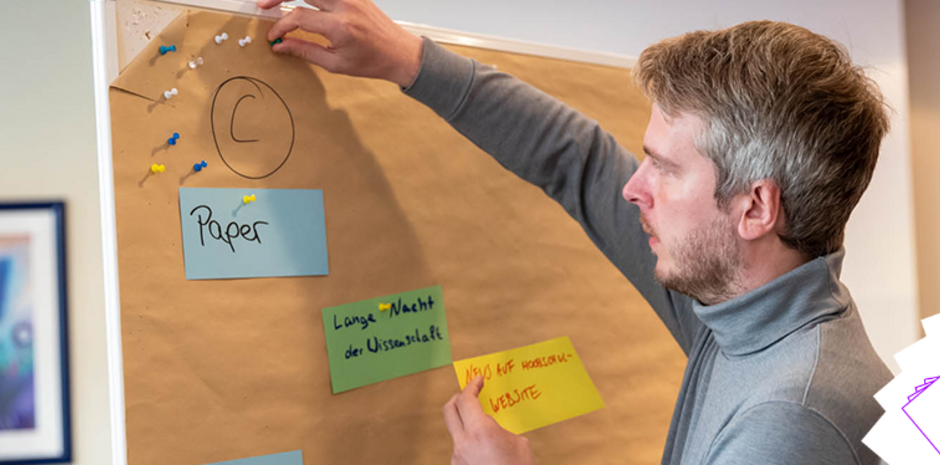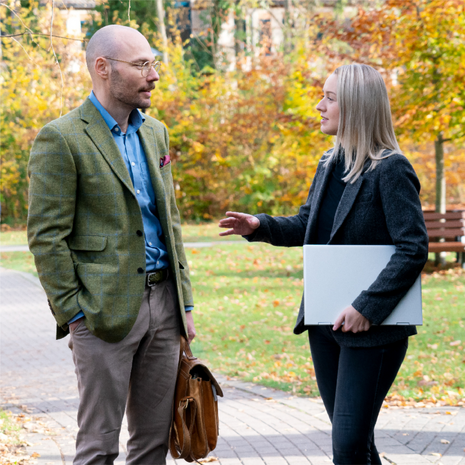
The path to a doctorate is an exciting but also demanding process that requires precise planning and support. On this page, you will find all the important information you need to take the first step in your doctoral project and successfully navigate your way through the Doctoral Centre. We accompany you on this journey with clear and structured processes – from the selection of your research topic to your official acceptance as a doctoral candidate.
Find out how to apply to one of our doctoral centres, what requirements you need to meet and how to find the right supervisor. You can also take advantage of the wide range of support options available to you throughout your doctoral studies.
If you have any questions or would like individual advice, Carolin Haupt, Advisor for Early-Career Researcher Support, will be happy to assist you. You can easily arrange a consultation appointment using our form.
Would you like to pursue a doctorate?
Before you start your doctorate, it is worth reflecting on your personal motivations: Why do you want to do a doctorate? What are your goals? And what are the general conditions associated with doing a doctorate?
Find out all you can about the requirements, opportunities and challenges – and actively seek out conversations with professors, doctoral candidates, your family and your friends. These perspectives will help you make an informed decision.
Got a topic in mind – now what?
Already have an idea for a dissertation topic and interested in doing a PhD at a university of applied sciences in Saxony-Anhalt? Then you've got lots of options!
Feel free to seek individual advice with no obligation – Carolin Haupt, Advisor for Early-Career Researcher Support at Harz University of Applied Sciences, will assist you with general questions as well as the first concrete steps.
You will also find helpful information on our website about financing and funding opportunities during the multi-year doctoral phase.
Admission requirements: What applies to your doctoral programme?
Before you officially start a doctoral programme, please find out about the specific admission requirements of the respective doctoral centre. The doctoral regulations form the legal basis for all doctoral programmes. They describe in detail the formal requirements that must be met and the rights and obligations of doctoral candidates during the doctoral process. We recommend that you read the relevant doctoral regulations carefully – they serve as a central guide for your doctoral programme.
Finding supervision: Who will supervise your doctoral studies?
The professors at Harz University of Applied Sciences who are involved in the doctoral centres can supervise your doctoral studies – provided that your topic fits their respective field of research. An overview of the supervising professors can be found on the websites of the two doctoral centres SGW (Social, Health and Economic Sciences) and IWIT (Engineering Sciences and Information Technologies). Contact a potential supervisor at an early stage. It is best to arrange an appointment during office hours to present your research project in person. For the initial contact, it is advisable to formulate your idea as concretely and structured as possible. If your primary supervisor works at another university, please also find out about the participating partner universities: Hochschule Anhalt, Hochschule Magdeburg-Stendal and Hochschule Merseburg.
Flesh out your research project
An important next step on the path to a doctorate is writing an exposé in which you present your planned research project in a clear and comprehensible manner. Your exposé should outline the current state of research, your research questions, the methodology and the time frame. Revise your draft together with your supervisor – this feedback is valuable for refining your topic. Once the topic has been agreed upon, you will sign a supervision or doctoral agreement together to formalise the collaboration.
Apply for official acceptance as a doctoral candidate
Once your doctoral or supervision agreement has been signed, you can apply for official acceptance as a doctoral candidate at the respective doctoral centre.
To do so, please fill out the application for acceptance (also known as the acceptance request) and the questionnaire for doctoral candidate statistics. Also include your supervision agreement, the exposé and all other required documents – please refer to the checklist of the respective doctoral centre.
The application with all required documents must be sent by post and digitally to the contact person at the university where your primary supervisor is based. Please ensure that both versions are complete and identical – this applies in particular to certified copies of certificates and documents (please scan these).
If your supervisor works at Harz University of Applied Sciences, please first send your documents for preliminary review digitally – in individual PDF files – to Carolin Haupt:
digitally to
promotion@hs-harz.de
by post to
Harz University of Applied Sciences
Attn: Carolin Haupt
Friedrichstraße 57–59
38855 Wernigerode
Please only submit the documents by post after receiving positive feedback on the digital preliminary review.
Decision on your acceptance
The doctoral committee of the respective doctoral centre will decide on your application for acceptance as a doctoral candidate. In some cases, acceptance is subject to academic requirements that you must fulfil during the doctoral phase.
You will be notified of the decision by post. Once you have been officially accepted, you will be registered as a doctoral candidate at the doctoral centre and can begin your academic work.
Enrolment and support during your doctorate
Once you have been accepted as a doctoral candidate, you have the option of enrolling as a doctoral student at the supervising university. Enrolment is voluntary, but it does have a number of advantages, such as the use of the semester ticket, library access and other university services. Please contact the respective university in advance to find out about the exact conditions and advantages.
Harz University of Applied Sciences supports all doctoral students with a wide range of interdisciplinary qualification, counselling and coaching formats. Take advantage of these offers to further develop your academic skills and ensure the long-term quality of your doctoral studies.
By registering at Harz University of Applied Sciences, you also contribute to the statistical recording of doctoral candidates – an important contribution to the further development of doctoral funding at state and federal level.
Further information on enrolment
Your doctoral phase begins
Once you have been accepted as a doctoral candidate and the content of your research project has been agreed upon, the central phase of your doctoral studies begins. You will devote yourself intensively to your academic work – supported by your supervisor, the Doctoral Centre and the services offered by Harz University of Applied Sciences.
You will generally have up to five years to complete your doctoral studies. If your dissertation is not completed by then, the doctoral committee will decide on the possible continuation of the doctoral process.
Exchange for success
Continuous scientific exchange with your supervisor is particularly crucial for a successful doctorate. In regular meetings, you can reflect on the progress of your work, discuss partial results and jointly develop solutions to open questions. This dialogue forms the basis for a structured approach to work and contributes significantly to achieving a well-founded and high-quality dissertation result.
Exchange among scientists
Professional dialogue with other researchers is an important part of every doctoral programme. Exchanging ideas in a working group, participating in scientific colloquia and discussing your results with peers and experts not only promotes your own scientific development, but also enhances the quality of your dissertation.
During your doctoral studies, attend at least two seminars or events organised by the respective doctoral centre. In addition, consistently adhere to the principles of good scientific practice in your research and writing – they form the basis for trustworthy and responsible research.
Harz University supports all doctoral candidates with a wide range of interdisciplinary qualification and advisory services. As the advisor for the promotion of young academics, Carolin Haupt is available at any time for individual consultation and will help you to successfully complete your doctorate.
Take advantage of these services to ensure the quality of your academic work and to advance your doctoral studies in a targeted manner. If you have any questions about specific programmes and events or need support in the doctoral process, please feel free to contact Carolin Haupt at any time.
You can also subscribe to our Newsletter to stay informed about new services and events designed to support doctoral students.
Admission to the doctoral programme
Once your dissertation is complete, submit an application for admission to the doctoral programme to the doctoral committee. To do so, submit your dissertation and all other required documents in both printed and digital form. Please refer to the applicable doctoral regulations to ensure that all requirements are met.
The application for admission and initiation of the doctoral procedure is available on request from your responsible advisor for the promotion of young researchers. They will also assist you with the formal processing of the procedure.
As part of the application for admission, you can propose reviewers for your dissertation. One of the reviewers will be a member of the doctoral centre and will match your field of study. The second reviewer will be external in order to assess your dissertation comprehensively and independently. Please note that your supervisor may not act as a reviewer. This is to ensure the independence of the reviews, as recommended by the German Council of Science and Humanities.
After submitting your application for admission to the doctoral programme, the doctoral committee will decide whether to officially initiate the process. If so, the committee will appoint a doctoral commission for your doctoral programme and select the reviewers for your dissertation.
Reviewers and decision of the doctoral committee
The reviewers then have eight weeks to review your dissertation and submit an assessment proposal. Once the reviews are available, they will be made available for inspection together with your dissertation for two weeks.
After this period, the doctoral committee will decide on the acceptance of your dissertation based on the reviews. In some cases, the committee may request that you make additions or changes to your dissertation before it can be finally accepted. In such cases, you will be given a deadline for revising your dissertation.
Defending your dissertation (disputation)
No later than three months after your dissertation has been accepted, you must defend it publicly at the university and orally before the doctoral committee. The committee includes other professors as well as your supervisor and the reviewers of your dissertation.
Before the defence, you'll give a talk of up to 30 minutes to present the main findings of your thesis. This is followed by a 60- to 90-minute exam to discuss the content of your thesis and the reviews. However, the defence extends beyond the dissertation and also covers related problems in the subject area, related disciplines and the current state of research in these areas (see the doctoral regulations of IWIT and SGW).
Immediately after the defence, you will receive the overall grade for your dissertation and the defence. This completes the doctoral procedure.
Publication of the dissertation
After the defence, you have two years to publish your dissertation. Make sure to comply with any conditions imposed on you by the doctoral committee after the defence.
Before publishing your dissertation, the final version must be approved by the chair of the doctoral committee. Only after this approval can you officially publish your dissertation.
Receipt of your doctoral certificate
Once your dissertation has been published and the required copies have been received by the Doctoral Centre, you will receive your doctoral certificate. From this point on, you are officially entitled to use the title of Doctor.
Congratulations – you have successfully completed the final step on the path to your doctorate!

